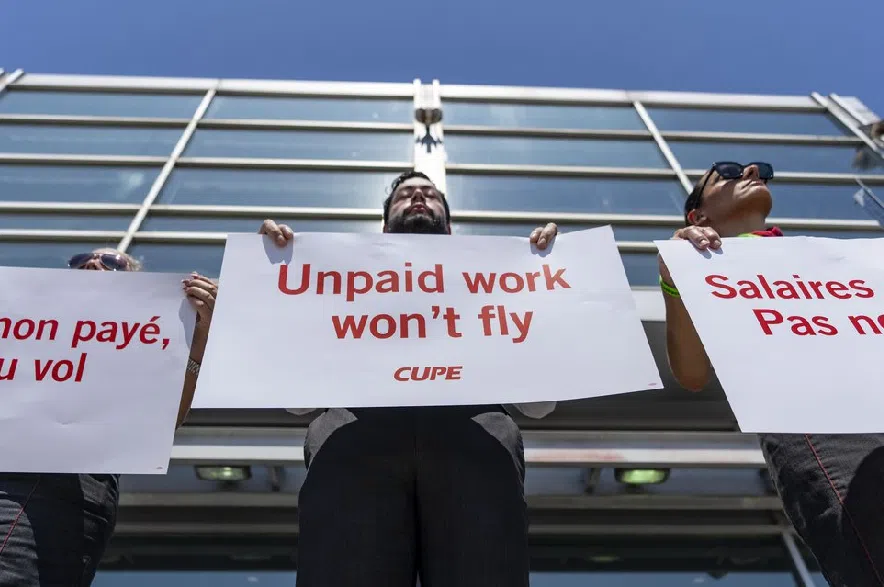Air Canada flight attendants have rejected the employer’s wage offer.
Flight attendants at Air Canada wrapped up voting at 3 p.m. ET today on a tentative new contract, with 99.1 per cent voting down the airline’s wage offer.
The airline says the wage portion will now be referred to mediation as previously agreed to by both sides.
Read more:
- Air Canada communication over cancellations frustrating for travellers
- After Air Canada strike, Ottawa may need to change its intervention strategy: experts
- Sarah Mills: No sleep while sitting next to snoring passenger on long flight
The Air Canada component of the Canadian Union of Public Employees (CUPE) says most terms would still form part of a new collective agreement with the airline, with the exception of the wage issue.
Air Canada and CUPE Head to Mediation Over Outstanding Issue : https://t.co/IuUHCOpkeW
//
Air Canada et le SCFP iront en médiation pour régler la dernière question en suspens : https://t.co/CJVbmnMIWy— Air Canada (@AirCanada) September 6, 2025
The union representing more than 10,000 flight attendants and Air Canada agreed to the tentative new agreement in August that was to raise wages and establish a pay structure for time worked when aircraft are on the ground, ending a strike that upended thousands of customers’ travel plans.
Terms of the tentative deal shared by the Air Canada component ofCUPE on its website included a 12 per cent salary increase this year for most junior flight attendants, while more senior members were set for an eight per cent pay bump.
All members were set for a three per cent raise in 2026, followed by 2.5 per cent in 2027 and 2.75 per cent in 2028.
While members finished voting today on the full package, a large chunk of the terms within it — such as those setting out rules for pensions and retirement bridging, health benefits, prone rest and vacation — are already considered final, as agreed to by both Air Canada and the union.
Ground pay agreement considered final
The tentative agreement was set to run to March 2029, and addresses the contentious issue of unpaid work while airplanes are not in the air.
Starting this year, the terms said flight attendants would receive half their hourly wage rate for 60 minutes of ground time on narrow-body aircraft and 70 minutes on wide-body planes. That would rise to 60 per cent of the hourly wage rate next April, 65 per cent in 2027 and 70 per cent in 2028.
The terms surrounding ground pay were also considered final, regardless of the results from the vote.
Air Canada’s flight attendants went on strike on Saturday, Aug 16. Jobs Minister Patty Hajdu intervened in the strike less than 12 hours later, invoking Section 107 of the Canada Labour Code to force the airline and the union into binding arbitration.
The Canada Industrial Relations Board ordered flight attendants to return to work Sunday, Aug. 17.
That order was defied by union officials, leading the board to state on Aug. 18 that the strike was unlawful even as the union said it would press ahead.
The company and union resumed negotiations Monday evening before reaching a tentative agreement overnight on Aug. 19.
Two days after restarting operations following the strike’s conclusion, Air Canada said most of its domestic and international routes were back up and running, although the airline said ti was expected to take up to 10 days for service to return to normal levels across Air Canada and Air Canada Rouge.
The company also introduced a policy to reimburse certain customers if they booked alternative transportation in lieu of cancelled flights between Aug. 15 and Aug. 23, along with other “reasonable” expenses they incurred such as for accommodation and meals.
Read more:











